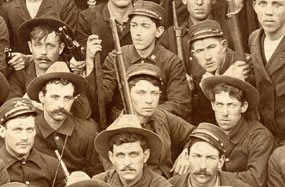
Although born more than a decade after the Civil War ended, growing up in Galesburg exposed Sandburg to Civil War history – site of an Abraham Lincoln and Stephen Douglas Debate and a stop on the Underground Railroad. Sandburg himself learned the life of a solider in 1898 when he served in the 6th Regiment Illinois Volunteers in Puerto Rico under the command of General Nelson A. Miles. Miles was a brigadier general in some of the bloodiest battles of the Potomac during the Civil War. Together, these experiences instilled in Sandburg an understanding of the Civil War and, more importantly, Abraham Lincoln, the president that kept the country together and fought for the rights of all Americans. Sandburg’s own immigrant experience and early life led him to believe that economic inequality was the root cause of all social strife. He understood that the emancipation of over four million men, women, and children following the Civil War was not welcomed by all and that this new found liberty resulted in terror and discrimination. To him, the end of the Civil War was the beginning of a bitter battle for Civil Rights in America. The Daily News sent Sandburg on assignment to investigate the causes of racial tensions in Chicago. He found through conversations with people in the “black belt” that they had moved from the South in search of jobs and better lives. Yet, they were met with closed doors, violence, and harassment. He interviewed returned veterans and women with children, always reaching the same conclusion: economic equity would ease the “race question.” His articles advocated for more education opportunities, job training, and equal access to housing – recommendations that were radical during the time and would go unheeded for nearly forty more years. When Chicago erupted into race riots in 1919, Sandburg was reminded of the savagery of the Civil War. He wrote, “On the one hand we have blind lawless government failing to function through policemen ignorant of Lincoln, the Civil War, the Emancipation Proclamation, and a theory sanctioned and baptized in a storm of red blood. And on the other hand we have a gaunt involuntary poverty from which issues the hoodlum.”
His articles were collected and published as a pamphlet entitled Chicago Race Riots: July 1919. His worked reported the harsh facts of race relations in Chicago and across the nation. More significantly, though, this work gained notice through its unbiased and objective reporting, earning him a lifetime achievement award from the NAACP, National Association for the Advancement of Colored People, in 1965. This award was considered one of Sandburg’s proudest achievements and one of the few awards he displayed at Connemara. Sandburg's connection to the Civil War continued when he moved to Flat Rock, NC in 1945. Their new home, Connemara, was originally built by a high ranking officer in the Confederate government and holds a rich Civil War history. Read more about the history of Connemara here. |
Last updated: April 14, 2015
